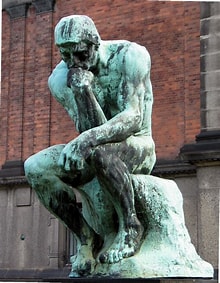Background Passages: Psalm 1:1-4, Jeremiah 17:7-8, Philippians 4:8, and 2 Corinthians 10:3-5
The route we typically took to my parents’ house from Pasadena to Ropesville was honestly not the most scenic drive. While there is something to be said for the stark beauty of the endless highway and cotton fields, the trip that we took countless times was little more than the occasional mesa, a random Dairy Queen and a lot of flat, empty space.
I recall making that drive early in our marriage before children as we sat in silence while the country droned by. I felt Robin’s eyes on me long before she asked the question every husband dreads.
“What are you thinking?”
Every husband knows my response. “Nothing.” Also, as every husband knows, that’s exactly what I was thinking in that exact moment and in most moments of solitude. Absolutely nothing.
Comedian Mark Gungor would say, “I was in my Nothing Box.” (If you’ve never seen that YouTube video about how the brains of men and women work, it’s worth the view.)
The Bible talks a lot about our thought life. Though it’s slightly out of context, Solomon lets us know in Proverbs 23:7 that “As a man thinks, so he is.”
In other words, you are what you think. Whatever we choose to concentrate on, spend our time thinking about, will impact the way we choose to live.
Hear the instructive word of the Psalmist.
Blessed is the one who does not walk in step with the wicked or stand in the way sinners take or sit in the company of mockers, but whose delight is in the law of the Lord, and who meditates on his law day and night. That person is like a tree planted by streams of water which yields its fruit in season and whose leaf does not wither—whatever they do prospers. Not so the wicked. They are like chaff that the wind blows away. (Psalm 1:1-4)
As the opening hymn of the Psalm, the passage answers some amazingly deep questions about life. Who am I going to be? Who is God? Where can I find true contentment and happiness? What road should I take in life? What is my purpose?
It is a call to be blessed. To find contentment and joy, regardless of life’s circumstances. The passage puts us squarely in the middle of the fork in the road. The first path is walked by the wicked, the sinners and the mockers of all that is holy.
Jesus might have called it Broadway. He said in Matthew 7:13, “…For wide is the gate and broad is the road that leads to destruction, and many enter through it.”
That first step down the path of the wicked and the way of the sinner always begin with a thought, an idea, a desire that pops in our head that entices and seduces us. We begin to think walking that path would be so much more fun, so much more profitable, so much more popular, that we can’t help but start the journey. As we think, so we are. It doesn’t take long for our thoughts to take hold in our hearts. Now, instead of just thinking about things we shouldn’t, we’re doing them.
Sadly, Paul and I have much in common on this point. I suspect most of us do.
I do not understand what I do. For what I want to do I do not do, but what I hate I do…For I know that good itself does not dwell in me, that is, in my sinful nature. I have the desire to do what is good, but I cannot carry it out. For I do not do the good I want to do, but the evil I do not want to do–this I keep doing. (Romans 7:15,18-19)
We won’t find contentment on the broad road described by Jesus or the way of the wicked described by the Psalmist. Rather, we’ll end up feeling more and more like Paul. We don’t intend to walk that path, but the world makes it look easy and appealing.
Blessedness (joy and contentment) comes, according to Psalm 1, when we don’t follow in the footsteps of those who do evil or take the path sinners take or travel among the scoffers who know nothing of God and his grace or goodness. It is the road to destruction…to chaff. An existence in which we are blown in whatever direction the wind blows. Never truly grounded. Always acting on a whim.
The Psalmist said the one who is blessed will find a different road to travel. In that same passage in Matthew, Jesus tells us to use the narrow gate and the “narrow road that leads to life and only a few find it.” As Robert Frost said, “…the road less traveled.”
Blessedness flows to the one whose “delight is in the law of the Lord, and who meditates on his law day and night.” Delight is a heart response to something or someone of beauty and value, in this case, God’s word and its truth. The word “delight” is used typically in scripture to describe the life in which God’s purpose and choice are in view.
It is joy, pleasure and satisfaction that comes when we abide in his word and will. Such delight comes only from delving deeply into scripture, finding its relevance for our lives and acting daily upon it.
The one who thinks only about the truths and promises of God found in his word is the one who walks in the path of the righteous and stands in the way of the faithful or sits in the company of those who trust in God’s word. You see, as a man thinks, so he is.
If we think of the things of God, those will be the attributes ingrained in us. It is an immutable truth repeated time and time again in scripture.
Since, then, you have been raised with Christ, set your hearts on things above, where Christ is, seated at the right hand of God. Set your minds on things above, not on earthy things. (Colossians 3:1-2)
Then, look at what Paul tells the Philippian church about the way we ought to think.
He begins the passage by exhorting his readers to “rejoice.” To find joy. To find contentment. To find a peace that “transcends all understanding…” Then, he tells them how.
Finally, brothers and sisters, whatever is true, whatever is noble, whatever is right, whatever is pure, whatever is lovely, whatever is admirable—if anything is excellent or praiseworthy—think about such things. Whatever you have learned or received or heard from me, or seen in me—put it into practice. And the God of peace will be with you. (Philippians 4:4-8)
Paul expresses in such a beautiful and poetic way how our thoughts ought to be directed.
Jesus even alludes to it in his Beatitudes when he says, “Blessed are the pure in heart, for they will see God.”
Given that the heart was viewed in the Jewish culture as the center of thought and will, Jesus says those whose thoughts are pure, whose motives for every decision are aligned with God’s word and will—these are the souls who will see God at work in their lives. These are the folks who find God in every circumstance of life—good or bad.
You are what you think.
Paul shared one more thought in his second letter to the Corinthian church which feels applicable here.
Though we live in the world, we do not wage war as the world does. The weapons we fight with are not the weapons of the world. On the contrary, they have divine power to demolish strongholds. We demolish arguments and every pretension that sets itself up against the knowledge of God, and we take captive every thought to make it obedient to Christ. (2 Corinthians 10:3-5)
Don’t you love that last phrase?
…take captive every thought to make it obedient to Christ…
The Greek word used for “take captive” means “to control, to conquer, to bring into submission.” We bring into submission every thought so that it conforms to the teachings of Christ. We conquer our tendency to dwell on things we shouldn’t be thinking about. We control those wicked thoughts by not letting them take root in our heart and soul.
The good news is that the Psalmist tells us how to do this.
We take captive our thoughts ”by meditating on the law day and night.”
Our hearts desire must be to embed ourselves so deeply in God’s word and all that it teaches us that we have little time to think of anything else. To be so grounded in scripture, that every temptation is answered by the Spirit’s whispered reminder of what has been taught us through God’s word…just as Jesus refuted every temptation from Satan with a word from scripture.
It’s not enough to just hear scripture read to you in Sunday School or from the pulpit. We need to spend time during the week studying God’s word, especially when the pervasive garbage of the world tries so hard to infiltrate our every thought.
The Rev. Charles Spurgeon said, “A Bible that is falling apart usually belongs to someone who isn’t.”
I’ll revert to the Proverbs, an ancient equivalent to the modern day “garbage in, garbage out.” Proverbs 15:14 says that “A wise person is hungry for knowledge, while the fool feeds on trash.”
You are what you think.
I like the idea the Psalmist conveys when he says what it is like to be one who immerses himself in God’s word.
That person is like a tree planted by streams of water which yields its fruit in season and whose leaf does not wither—whatever they do prospers.
Jeremiah shares a similar thought.
Bless is the one who trusts in the Lord, whose confidence is in him. They will be like a tree planted by the water that sends out its roots by the stream. It does not fear when heat comes; its leaves are always green. It has no worries in a year of drought and never fails to bear fruit. (Jeremiah 17:7-8)
You must love this tree metaphor as much as I do.
Notice that the tree is planted by the stream. It didn’t grow up there on its own accord. It was planted. Planted means to cause to take root. The Hebrew word used here more closely translates as “transplanted.” To cause to take root after moving from one environment to another more suited for growth.
I love that idea in the context of this Psalm that talks about the way of the wicked opposed to the way of the righteous seen in the one who dwells in God’s word. That person is transplanted from the path of wicked, the sinner and the scoffer to live and grow next to the living water found in God’s word through Christ Jesus.
A tree’s roots run deep, searching always for the moisture and nutrients that fuel its growth. The deeper its roots go, the more sturdy and stable it becomes , more capable of withstanding any wind that blows. (In contrast, it takes very little wind to blow away the chaff.)
That’s how it is with one grounded deeply in scripture. She finds the spiritual water and nutrients to grow and mature in Christ. And, like the tree, that kind of growth takes time. We live in a time of instant gratification, but the Christian life is a process of growing and learning. Each minute we stop looking to the Bible for our strength is a lost moment in our spiritual lives.
Notice also that the tree yields fruit. Our time spend in studying God’s word will always point us to ministry and service. It is the understanding of what God requires of us that propels us to care for and serve others.
The message of this Psalm hit me squarely between the eyes this week.
You are what you think.
As we walk through each day, let’s meditate on God’s word…day and night. Think about the things of God. When we do, it’s so much easier to…
Be the tree.








